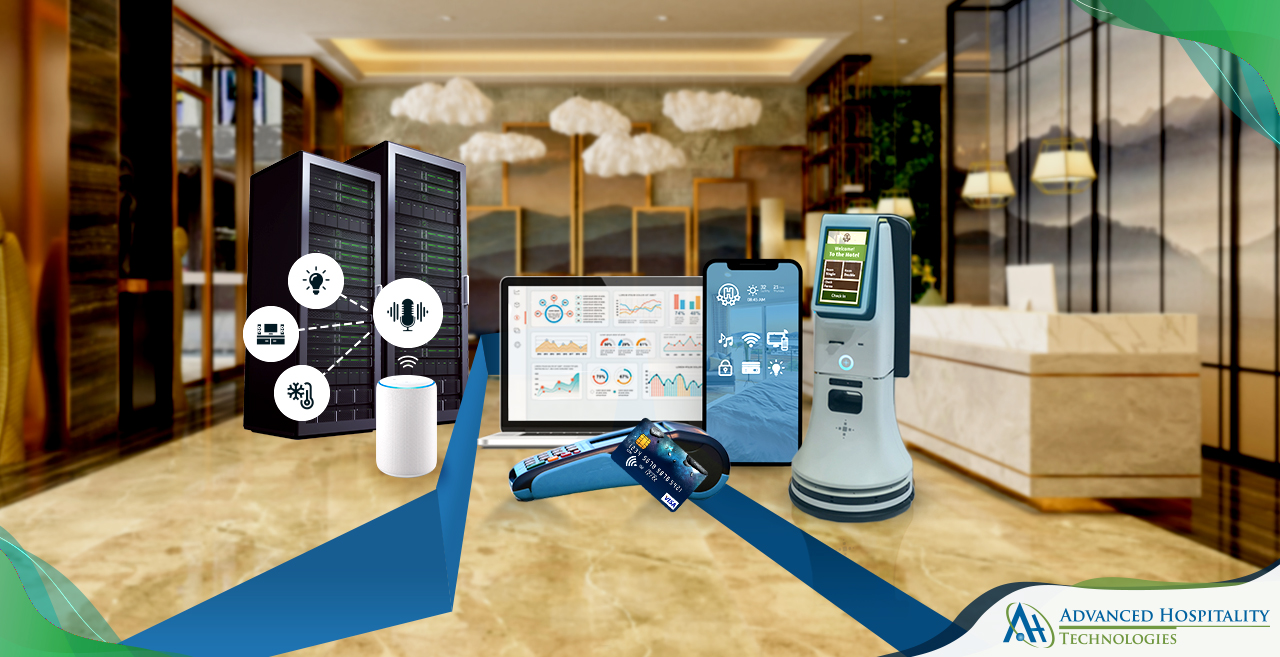Hospitality has been pivoting around technological innovations for quite a few years. The year 2023 brough with it many new technology trends. The hospitality industry is rapidly evolving to meet rising guest demands for unique, customized, and environmentally conscious travel encounters. Advanced technologies integrated around sustainability, health, connectivity, and hyper-personalization will shape leisure and business travel in the coming years. Here are six hospitality and hotel trends for 2024 that will likely emerge at the forefront.
Sustainable Hospitality Focused on Eco-Friendly Operations
Sustainability is no longer a trend; it’s a necessity. Guests are increasingly concerned about the environmental impact of their travel and expect hotels to prioritize eco-friendly practices. This includes initiatives like using renewable energy sources, sourcing local food, and reducing waste.
Transparency and communication: Guests demand transparency from hotels regarding their sustainability efforts. Hotels need to effectively communicate their commitments and initiatives to gain trust and build a positive reputation.
Sustainable design and construction: Sustainable design and construction are becoming essential aspects of building new hotels and renovating existing properties. Hotels are utilizing recycled materials, energy-efficient technologies, and innovative green solutions to minimize their environmental footprint.
AI Driven Hyper Personalized Hotel Stays
The future of the hospitality industry points towards artificial intelligence (AI) enabled hyper customization for travelers. Powerful algorithms will analyze guest behaviors, histories, location data and preferences to create tailored profiles, which inform every on-site touchpoint.
Membership programs, hotel apps, loyalty promotions and customer relationship management platforms collect extensive visitor details. This allows precisely targeted amenities, service offers, room ambience adjustments and marketing prompts curated for the individual.
Potential Predictions:
– Guest room default settings like lighting, temperature and entertainment synchronize to pre-set preferences
– In-room tablets enable easy modification to personalized features
– Favorite newspapers, magazines, snacks, or beverages await patrons upon check-in
– Guests receive special room service, spa treatment or restaurant recommendations based on past bookings
– Unique promotional packages automatically populate at certain loyalty point thresholds
– Location-based push notifications advise visitors regarding customized local attractions
Nearly uncanny levels of customization might become possible. However, traveler data gathering, privacy and consent requires thoughtful policies amidst digital transformation.
Advanced metrics will also assist staffing. Hotels can accurately predict occupancy spikes from previous years’ trends or surrounding events. Internal work planning software can schedule optimal housekeeping, kitchen, or front desk shifts. External candidate relationship management portals can fill vacant roles right when demand escalates.
Immersive, High-Tech Features for the Guest Journeys
In 2024 and beyond, smooth functioning, convenient high-tech features will integrate across hospitality venues. Hyper connectivity through lightning speed internet, location detecting beacons and multi-language visual guidance tools would assist world travelers. Voice commands via smart devices will simplify environment interactions.
Contactless experiences represent a shift, enabling guests to bypass front desks via app-based check-ins. Digital key cell phone downloads grant room entry permission. Inside, guests can verbally instruct room controls on optimal temperature, entertainment, and lighting ambience without touching remote controls or panels.
Travelers seeking knowledge can access interactive apps highlighting local attractions, navigation, weather updates and trip planning logistics on provided tablets. Web conference rooms have one-touch start networking equipment and design elements promoting collaboration. Some venues offer AR-guided art gallery tours, giving 3D perspectives on featured collections. Others provide virtual reality programming allowing guests to envision room renovation concepts firsthand. Outside, GPS tracking maps guide runners and hikers along area trails.

Wellness Travel Prioritization
Wellness travel will expand drastically in 2024 and be prominent among the hospitality trends for 2024, it is forecasted to represent over 12% of tourism industry spending by 2025 in a report by Skift Magazine. Hospitality venues now integrate more dedicated spa and fitness amenities amidst increasing mental, physical, and nutritional guest priorities. Health-supportive dining, restorative programming and accessible treatment options represent mainstays of this projected half trillion-dollar sector.
Human Touch
The importance of human interaction outweighs reliance on tech-exclusive experiences, particularly regarding luxury personalization. Guests expect staff recognition and services enhancing stays beyond app-based adjustments. Visitor needs still warrant human intuition and problem-solving skills, found in dedicated concierges, butlers, housekeepers, and food and beverage workers. Brands that balance high tech options with high touch, empathy-focused staff are likely to achieve the highest service ratings through economic volatility. Those preserving jobs from automation gain employee and public devotion. Investing in both technological conveniences and enduring human connections makes for memorable futures.
Experiential Travel will be among key Hospitality Trends for 2024
Travelers are seeking immersive experiences that go beyond sightseeing and relaxation. Hotels are catering to this demand by offering unique activities and programs that allow guests to connect with the local culture, learn new skills, and participate in meaningful experiences.
Authenticity and local connection: Guests crave genuine experiences that provide a deeper understanding of the local culture and traditions. Hotels can offer cultural immersion programs, partner with local businesses, and highlight the unique aspects of their destination.
Wellness and mindfulness: Promoting holistic well-being is a top priority for many travelers. Hotels are responding by offering yoga retreats, meditation sessions, spa treatments, and access to nature.
Culinary travel: Guests are seeking unique and authentic culinary experiences. Hotels can partner with local chefs, offer cooking classes, and provide access to farmers markets and traditional restaurants.
Adventure and exploration: Travelers are seeking opportunities to explore and experience the thrill of the unknown. Hotels can offer guided hikes, biking tours, water sports activities, and other adventurous experiences.
Data Security
While relying upon ever advancing technologies, hospitality properties remain constantly vulnerable to cyber-attacks, given the wealth of sensitive customer data acquired. The years ahead require complex, stringent safeguards against substantial financial and reputational impacts.
With PCI DSS 4.0 becoming mandatory from April 2024, the focus on data security will be on an all-time high and will be one of the most important hospitality trends for 2024. Mandatory password protection paired with RFID name badges prevent unauthorized staff system access. Installation of malware detectors, threat monitoring firewalls and data encryption by specialized IT teams minimize risks.
Contingency preparation also proves vital. Response plans are engaged if threats emerge, addressing communication protocols and recovery steps. Rigorous cybersecurity awareness education trains employees in latest scams, suspicious email detection and responsible guest data handling.
Regular third-party auditing ensures policies adhere to legal and industry standards. For utmost security, venues may employ niche cybersecurity leadership positions like Chief Information Security Officers.
The Verdict on the Future of the Hospitality Industry
The hospitality industry is heading towards an exciting inflection point marrying customization, radical sustainability, and optimized guest experiences through integrated technology. Traveler wellness and personalized care still warrant human skill. Though innovations propel competitive edge, the guest heart desires human connection alongside machine efficiency.
The coming years promise memorable, enriched journeys for visitors globally. Tech-enhanced properties must focus equal effort on bolstering cyber protections, to secure data and maintain traveler trust. Ultimately astute hospitality leadership recognizing the value in both living labor and efficient integration of automation will likely thrive most sustainably.
Conclusion
The ways we travel will transform significantly in 2024. From hyper-personalized hotel stays, curating local culture to eco-friendly operations, exciting hospitality advancements arise on the horizon. However, through potential volatility, the guest heart still compels human touch alongside automation. Hotels must embrace both to craft hospitality’s inspiring future.




